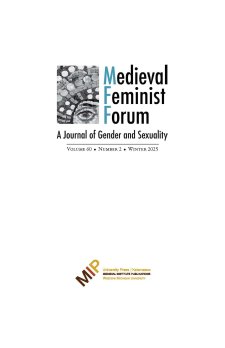Medieval Feminist Forum: A Journal of Gender and Sexuality
Medieval Feminist Forum: A Journal of Gender and Sexuality (MFF, e-ISSN 2151-6073) is an online, peer-reviewed journal of interdisciplinary scholarship on women, gender, and sexuality in medieval studies. We invite studies of literature, history, religion, art and architecture, and medievalism, including ones that employ theoretical models ranging from (but not limited to) queer theory and trans studies, critical race theory, decolonial and postcolonial approaches, disability studies, ecocriticism, materiality, affect theory, and history of emotion. Studies of specific authors or events are welcome, but should be framed for an audience of feminist medievalists broadly construed as well as for specialists in the case study.
Current issue: Volume 60, number 2 (2025)
Articles
Bad Trans Feelings in "Bárðar saga Snæfellsáss" by Basil Arnould Price
Let Calle Hym Trystrams: Women's Reproductive Bodies and Resistance in Malory's "Le Morte Darthur" by Adelaide Greig
Marie de Clèves's "Rien ne m'est plus": Reshaping Widowhood in the "Roman de Troyle" by Molly Bronstein
"The Most Virile of Monks": Gender (and) Transformation in the Mystical Writings of Teresa of Ávila by Harri Hudspith
Dueling Narratives: Women and Heraldic Interpretation in Middle English Romance by Amy N. Vines
Becoming the Sibylline Astrologer: Invention, Inheritance, and Identity in Christine de Pisan's "le livre du chemin de longue étude" by Kimberly T. Anderson
Book Reviews
Caroline Bergvall's Medievalist Poetics: Migratory Texts and Transhistorical Methods, edited by Joshua Davies and Caroline Bergvall, review by Ruth Evans
Lordship and Governance by the Inheriting Countesses of Boulogne, 1160–1260 by Heather J. Tanner, review by Jessica Minieri
Nascere. Il parto dalla tarda antichità all'età moderna edited by Alessandra Foscati, Constanza Gislon Dopfel, and Antonella Parmeggiani, review by Marjolaine Raguin
Marian Maternity in Late-Medieval England by Mary Beth Long, review by Sarah Friedman
Maternal Materialities: Objects, Rituals and Material Evidence of Medieval and Early Modern Childbirth edited by Costanza Gislon Dopfel, review by Claire Kilgore
Premodern Masculinites in Transition edited by Konrad Eisenbichler and Jacqueline Murray, review by Hilary Rhodes
Remember the Hand: Manuscription in Early Medieval Iberia by Catherine Brown, review by Lara Farina
Resistance to Love in Medieval English Romance by Hannah Piercy, review by Amy N. Vines
Thousands and Thousands of Lovers: Sense of Community among the Nuns of Helfta by Anna Harrison, review by Silvia Negri
Women and Medieval Literary Culture: From the Early Middle Ages to the Fifteenth Century edited by Corinne Saunders and Dianne Watt, review by Melissa Elmes



